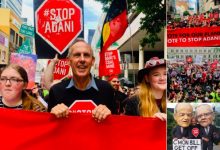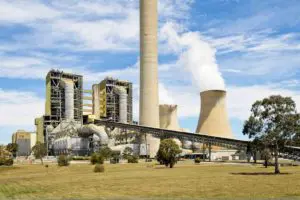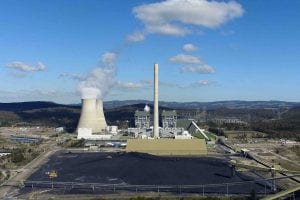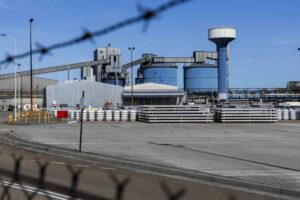Another major report has underlined the case for renewable energy to provide the lowest cost, most sustainable solution for Australia’s energy needs – noting that fossil fuels are still heavily subsidised while renewables need little more than policy certainty and guidance.
The new report, from the Institute of Energy Economics and Financial Analysis (IEEFA), came as a convoy led by former Greens leader Bob Brown attracted many thousands of people to its rallies as it moved north to the site of Adani’s Carmichael coal mine, before a planned return for a final, major rally in Canberra.
Brown’s long-promised convoy comes in the middle of an election campaign where climate is expected to figure strongly for voters, and where questions are being raised by the Coalition’s granting of ground-water approvals for the Adani coal mine in the days before the election was called, and now also on the controversial buy-backs of water rights.
Brown’s convoy – being led by a fleet of six Teslas and other electric vehicles – is due to gather near the mine site this weekend, and then move south for a final rally in Canberra on May 5, less than two weeks before an election seen as critical for the future course of energy and climate policy in Australia.
Brown was particularly damming of prime minister Scott Morrison’s decision to hold up a lump of coal in parliament and declare it to be good for humanity, and of the Murdoch media which has relentlessly chorused its support of fossil fuels and mocked climate science and renewables.
“When I read the Murdoch media and the diatribe against good people who stand up to this rotten fossil fuel industry … which is taking from all of us and our right to he hopeful about the future … I say you are complicit in that criminality (of building new coal mines) and … have torn up the rule book of journalist ethics,” Brown said at a rally in Mullumbimby on Sunday.
Another 5,000 people joined the convoy when it marched outside the Adani offices in Brisbane.
The IEEFA analysis says that fossil fuel extraction in Australia still benefits from massive taxpayer subsidies, including diesel fuel rebates (a $2 billion annual subsidy which largely goes to the thermal coal industry), free water, free carbon emissions, and massive often multi- decade royalty holidays.
It says that Australia must “belatedly consider” an outright ban on any new thermal coal mine development, which it says would be entirely consistent with our Paris Climate commitments, and particularly given Australia is a top three exported emissions nation globally.
It says this is made clear by the United Nations IPCC report of October 2018 and the fact that renewable energy is rapidly becoming the low-cost source of new generation globally is confirmed in the International Energy Agency’s World Energy Outlook 2018 report.
The report notes that the agency’s Sustainable Development Scenario – the one that actually matches the Paris climate scenarios – suggests that only five per cent of global electricity generation is based on thermal coal by 2040.
“However, the technology- and finance-driven inevitability of renewables is not happening fast enough in Australia to deliver on the Paris commitments, and without a national energy policy, this leaves Australia with a growing stranded asset risk, as recently highlighted by both the Reserve Bank of Australia and the Australian Prudential Regulatory Authority,” the report says.
“Australia must step up and take advantage of this low-cost, sustainable solution for Australia’s energy future – today.”
The problem is that the political debate in Australia is looking increasingly out of step with what is happening around the world.
Labor is not prepared to go beyond its 50 per cent renewable energy target for 2030, even though this would require a significant slow-down in deployment over the coming decade, because it is being described by the Coalition and most of the media as “reckless” and “economy wrecking”.
Yet it is the Greens policies are closer to the mainstream policies being promoted in Europe and the US, where countries are seeking to ban the sale of petrol and diesel cars, key Democrats are proposing a “Green New Deal” that promotes a rapid shift to a renewables-based economy by 2030, and numerous states are putting in their own 100 per cent renewable energy targets.
More radical social movements are also emerging, such as the student climate strikes and campaigns such as “Extinction Rebellion”, which are seeking to shake the public from its apathy around policy details.
 Even in the UK, the National Grid operator is putting in plans to be able to deal with extended periods of 100 per cent renewables by 2025,m by which time the current Tory government intends to end coal generation.
Even in the UK, the National Grid operator is putting in plans to be able to deal with extended periods of 100 per cent renewables by 2025,m by which time the current Tory government intends to end coal generation.
So it’s not surprising that in Australia, the Australian Energy Market Operator is now being pushed – even by the principal energy lobby groups and some of the biggest coal generator owners – to model a more rapid energy transition than contemplated by either major party.
That call – to take into account the growing costs and difficulties of maintaining the country’s ageing coal fleet, and to match Australia’s energy transition to the “real” Paris climate targets – will effectively result in a plan to reach zero emissions in the electricity grid well before 2050.
More economic analysis is being produced that shows – even on a global scale – that this can be done, and so can the electrification of other key sectors, transport and heating and manufacturing – to make renewables the dominant source in a cleaner, and cheaper, global energy system.
in Australia, the Coalition appears committed to coal, and while Labor is equivocating on projects like Adani’s, on Tuesday it outlined a major plant to unlock gas reserves in the Galilee Basin and elsewhere.
“This announcement demonstrates a political system fully in the thrall of the fossil fuels industry,” said Dan Gocher, from the Australian Centre for Corporate Responsibility. “The LNP have their coal patrons, the ALP have their gas patrons. Corporate capture is the tragedy of Australian politics. Sadly, voters are now presented with an awful dilemma – coal or gas.”
The irony is that the Greens are the only party in Australia that is prepared to frame its policy making around such scenarios.
Which makes the Bob Brown convoy all the more relevant. The rhetoric may be around the “criminality” of approving new thermal coal ventures, but it’s based on pretty sound environment, economic and engineering factors.
And it’s no coincidence that while Brown is driving north with hundreds of cars in tow and thousands joining him in rallies, the likes for Professor Ross Garnaut – who helped frame the climate policy agreed by the Gillard government and the Greens – are engaged in a series of public lectures underlying one of the key points of the IEEFA report:
Namely, that renewables are not just the lowest cost, sustainable solution for Australia’s energy policy crisis, they are potentially one of Australia’s largest export industries of the future.
News that Brown and Greens leaders were using Tesla EVs in the convoy attracted ridicule from the usual roll-call of nay-sayers. We shouldn’t be surprised. Nothing would upset these people more than evidence that the Greens are smarter about energy policy than they are. All it would take to understand this would be to look at the facts.








